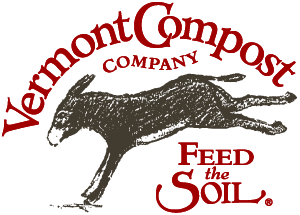Hours/Location:
When is Vermont Compost Company open?
We are open for loading from 9:00 am - 3:00pm Monday - Friday (by appointment), and Saturdays in May from 9:00 - Noon (no appointment needed).
Holidays we are closed: New Year's Day, Martin Luther King Jr. Day, Memorial Day, 4th of July, Labor Day, Indigenous People's Day, Thanksgiving Day, Christmas Day
Can we return our empty Vermont Compost bags or slings bags to your location?
We cannot accept bag returns due to the potential for contamination. Check out this article for ideas to reuse your bags.
Product/Usage Info
Instead of buying bags from my local retailer can we buy them at Vermont Compost?
Vermont Compost sells wholesale only – bulk by the cubic yard and bagged by the pallet. If you need less than a pallet quantity of soil (one pallet is equal to 80 x 20-quart bags, 36 x 45-quart bags, or 27 x 60-quart bags), please visit one of our retailers or order from one of our catalog or on-line sellers.
What is your compost made from?
Our compost is comprised of carefully sourced, high-quality ingredients: a fully mature composted blend of bovine, equine, and avian manures, hardwood bark, late cut hay, spoiled silage, sphagnum peat moss, animal bedding, and food residuals. We blend biodynamic preparations and mature compost to inspire bacterial and fungal activity. Our compost is also free of live weed seed, and any and all sewer sludge. Manure Compost is approved for use on certified organic farms and forms the base of all Vermont Compost soil mixes.
Please click here for more information on our compost process.
Do you sell soil products without animal manures?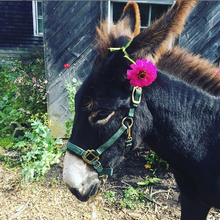
All of our soils contain animal manures.
Are your products food allergen friendly?
While all of the food scraps in our composts and potting soils are fully broken down through the composting process, we cannot guarantee that our products are food allergen friendly. We accept household and restaurant food residuals, therefore, we cannot offer a peanut, shellfish, or other allergen-free guarantee.
Are Vermont Compost products organic?
All ingredients used in Vermont Compost Company products are approved for certified organic production. Our composting process meets the National Organic Program (NOP) standard requirements and our products are approved by the Vermont Organic Farmers (VOF), the certification branch of NOFA-VT. Our primary goal is to serve our professional growing community with the highest quality composts and potting soils.
Are the food and manures you receive from organic farms?
Some of our input stream is indeed certified organic. Regardless of non-organic input, our process benchmarks for temperature and maturity ensure compliance as approved by VOF (Vermont Organic Farmers) for use in organic production. We believe that composting is the highest, best use for non-certified organic food scraps and manure.
Are your compost and potting soil sterile?
Healthy compost and potting soil contains the living biota necessary for successful soil and plant life.
Are Vermont Compost soils tested?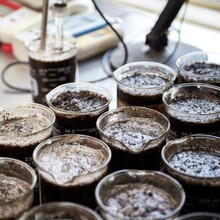
Yes. We perform plant germination and growth performance tests (bio-assays) on all composts and soil mixes on each and every batch we make. We also perform lab tests in-house to determine EC (electrical conductivity), pH, and NO3 (Nitrate) levels. We regularly send samples to outside University labs for total nutrient and saturated paste analysis, which provides additional information and corroboration of our in-house tests. Each compost has a batch number which follows it from the assembly of raw materials through process, invoicing, and delivery to the customer. Temperature and time of turning data are tracked to meet compliance standards for both the National Organic Program (NOP) and Vermont Organic Farmers (VOF; the certification branch of NOFA-VT).
How long is your compost aged?
Our compost is typically aged between eight and twelve months.
Is your compost weed seed free?
Yes. We go to great lengths to ensure that our compost and potting soil is weed free. Weed spores may drift across our exposed piles, but do not survive turning, weeding, and screening intervals. In order to avoid contamination during transportation, we ask customers to thoroughly clean their truck beds before loading.
Please click here for more information on our compost process.
How do I figure out how much soil I need?
We recommend using our soil coverage calculator tool to determine how much of a product you need for your specific application. Please select the product of your choice, and follow the link to access this tool.
Can I plant directly into your Manure Compost?
Our compost is best used as a soil amendment, not as a complete growing medium. Thus we recommend blending our compost with other soil, at no more than a 50% ratio of compost to other soil. If you prefer a complete growing medium, consider our Fort Vee, Fort Light, or Perennial Blend mixes.
Which soil do you recommend if using a soil block maker?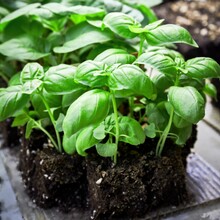
Fort Vee is ideal for making soil blocks, though Fort Light may also be used.
I recently built raised beds. Which soil do you recommend for filling them?
We recommend Perennial Blend for raised beds or gardens in need of soil volume. If you have existing garden soil or topsoil on site, we recommend amending it with Manure Compost.
I would like to apply Manure Compost to my entire garden. As a general rule, how many inches do you recommend?
We recommend anywhere from 1-3 inches of Manure Compost to amend a garden bed. Alternatively, we also offer our Perennial Blend if you are looking to establish or boost the overall soil volume of a garden or raised bed. You can use our soil coverage calculator tool, found on either product page to help determine how much you might need.
How much compost should I apply per acre?
Please call us at 802-223-6049 or email us for a consultation.
I recently started seeds. Now there is a white 'mold' growing on the soil. What is this and will it harm my plants?
We hear about "mold" issues in the early spring, when conditions are still cold and dark. A linen-white fluffy presence is normal and beneficial. The white growth is an actinomycetal flush which is non-pathogenic and will disappear. We recommend watering earlier in the day so that your plants go into the nighttime hours as dry as possible.
What are the suggested uses for Compost Plus?
This organic supplement can be added to “boost” or rejuvenate soil mix in containers or beds. It provides a blend of minerals and organic matter that improves texture and feeds the soil to nourish your plants. Also, excellent for top-dress or side-dress. Will not burn roots.
Food Scrap Drop-off/Pickup
Can we drop off our home kitchen scraps at Vermont Compost Company?
Yes. When entering our site at the North Entrance, you will find containers under the sign reading "Household Food Scrap Drop Off." These bins receive food scraps and a separate bin contains a sawdust blend you can use as a cover material to help control moisture and odor. Please deposit your food scraps and then sprinkle a scoop of the cover material on top. We encourage the use of reusable buckets for your compost. We do not accept any home compost container liner bags such as BioBags.
We accept ALL food scraps including: meat and bones, dairy, fish, egg shells, coffee grounds, tea, nut shells, grains, pet food, etc.
We DO NOT accept: Plastics of any kind (labeled “compostable” or otherwise), wax paper, PLU stickers, wood ash, leaves, grass clippings, any paper products or “compostable” plates, bowls, cups, or flatware, any non-Vermont Compost potting soil or ornamental plant material.
While there is no specific fee for dropping off your household scraps, we are employing a "Pay What You Can" system. There is a lockbox for cash and checks at the drop-off bar, and an option to enroll in a digital monthly subscription program here. We humbly suggest $2 per 5-gallon bucket or $10 per month for an average visitor. Thank you!
Please see our Food Scraps page for more information.
Do you offer residential pickup of food residuals?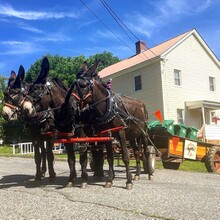
We currently offer food residuals pickup options in many areas of Washington County. For more information on general terms and conditions, please see our Food Scraps page for more information, or call 802-598-0470.
I manage a business that generates food waste. How do I arrange to have our food waste picked-up?
Vermont Compost Company offers collection services to commercial food residuals producers. Please see our Food Scraps page for more information, or call 802-598-0470.
Do you take yard debris?
Yes, by appointment only. We also take brush, tree limbs, and stumps. For more information, or to book an appointment: 802-223-6049, option 3.
Eggs & Chickens
Are your chickens free-range?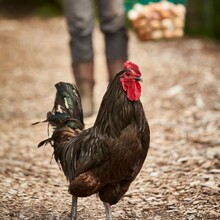
Yes they are! Our birds are free to roam the entirety of our Main Street farm location during the day, and spend their evenings locked safely within the laying house.
What do your chickens eat?
Our chickens "compost forage", which is a system or practice that incorporates source-separated food residuals, manure, other farm residuals, high carbon bulking agents, other forest materials and organics into a blend sufficient to support sustenance for our flock while also allowing them access to important grubs, worms and roots.
I am interested in purchasing eggs. Where can I find them?
Our eggs can be found at these retail locations:
- Hunger Mountain Co-op, Montpelier VT
- Farmers To You, Online
